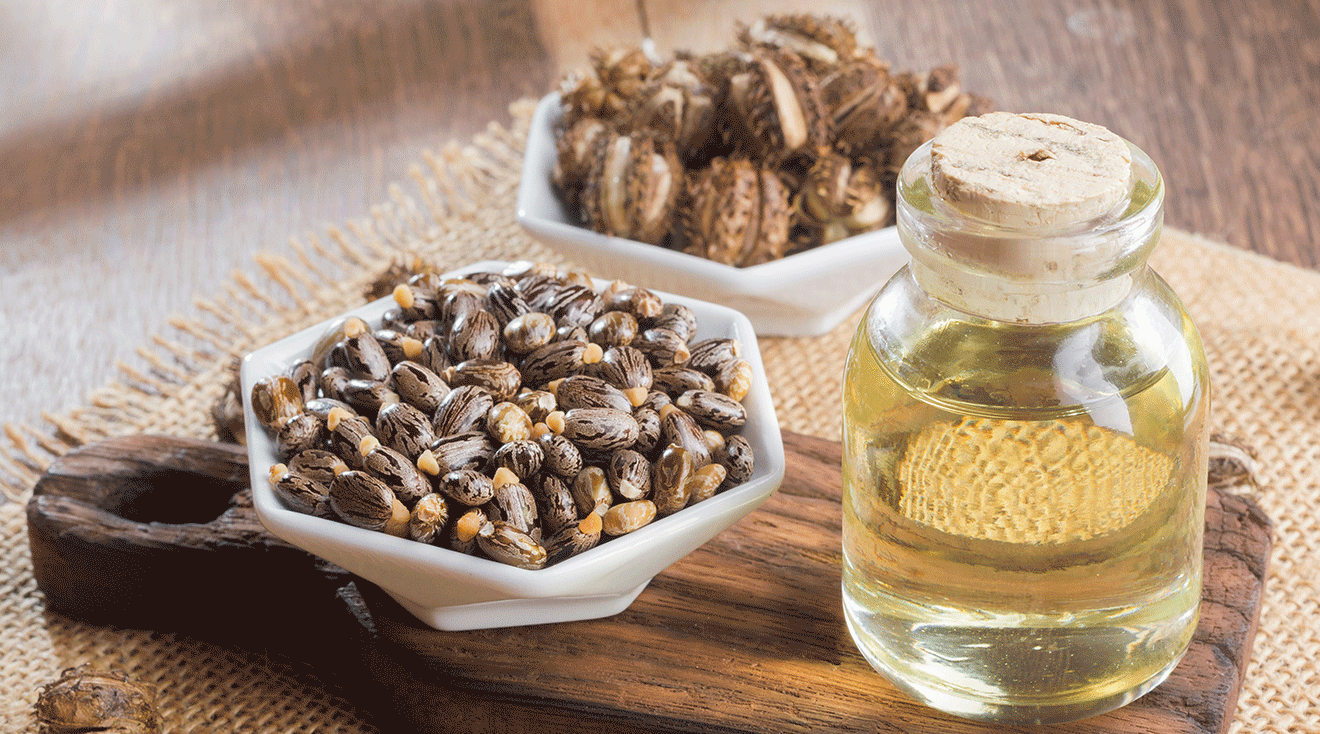Is It Safe to Drink Castor Oil to Induce Labor?
If you’ve been pregnant for what feels like an eternity and can’t wait to get this whole “human being coming out of my body” thing over with, chances are you’ve looked into natural ways to jumpstart labor. Maybe you’ve tried unscientific methods like having sex or eating spicy foods, but they haven’t worked. As you’re looking for advice on naturally inducing labor, it’s only a matter of time before someone tells you to drink castor oil.
That’s right, castor oil: the stuff social media influencers tell you to use to moisturize dry skin and encourage long, luscious hair growth. But is it safe to use castor oil to induce labor? In general, experts say the risks and side effects aren’t worth it—but that you should reach out to your provider for individualized support. Here’s what else you need to know about drinking castor oil during pregnancy.
Castor oil is a vegetable oil made from a plant called Ricinus communis. It might be most well-known for its laxative effects; in fact, its only US Food and Drug Administration-approved use is as a stimulant laxative to treat constipation.
Castor oil has several other possible medicinal uses, however, says Kecia Gaither, MD, maternal-fetal medicine director at NYC Health + Hospitals/Lincoln in the Bronx and associate professor of clinical obstetrics and gynecology at Weill Cornell Medicine. They include easing joint pain and inflammation and soothing irritated skin. It’s also often used as an additive in foods, skin-care products, and other manufactured goods like plastics and paint, she says.
Gaither says castor oil may promote the release of prostaglandins, hormones that stimulate uterine contractions, which leads to cervical effacement and dilation—two key components of your Bishop score, aka the system healthcare providers use to determine how “favorable” your body is to giving birth.
Gaither says she’s not aware of any research that definitively proves a link between castor oil and labor, although there’s some research that suggests this possibility, including eight clinical trials in a 2022 review looking at castor oil’s labor-inducing potential. Out of those eight clinical trials, six studies showed a positive association between castor oil and labor induction. The meta-analysis also showed a positive association between castor oil and Bishop score. However, a small 2013 study showed no meaningful difference between castor oil and a placebo in preparing the cervix for labor.
Bottom line? “Castor oil can be an effective way to stimulate labor, but it works better if your body and your baby are ready for the birth to happen,” says Melissa Dean, CPM, midwife and founder of Casa Natal Birth and Wellness Center in San Francisco. “Attempting to use castor oil before your due date may not work. It works by causing intestinal irritability, which then can stimulate the uterus to contract.”
While studies strongly suggest that castor oil could speed up labor, that doesn’t mean it’s always safe to use. Dean cautions not to use it before your due date, as it could cause preterm labor, adding that it’s not safe to take at all before you reach early term at 37 weeks.
Again, many providers will flat-out tell you to avoid using castor oil to induce labor altogether, while others may be open to the idea if it’s done safely and appropriately.
Dean says that because castor oil can cause diarrhea and sometimes vomiting, if you take it you run the risk of becoming dehydrated, in some cases severely—which can cause irregular labor patterns and actually slow down the labor process. Nausea was also listed as a side effect of castor oil use in two of the eight studies included in the 2022 review noted earlier, as well as in a 2018 study.
Castor oil could affect baby’s GI system too, says Dean. “[It’s possible] that castor oil can stimulate baby to have a bowel movement before birth, which causes meconium-stained fluid [that in large amounts] can cause problems for babies after birth,” she says. This is also known as meconium aspiration syndrome, and while most newborns recover easily with the right care and treatment, it can cause breathing difficulties and respiratory infection.
If you’re thinking about using castor oil for labor, it’s best to talk to your provider first. If you receive the green light from your provider, here are some things to keep in mind.
Castor oil dosage
While some providers suggest expectant moms can take a full, 3-ounce dose all at once—sometimes called a “labor cocktail”—Dean says she prefers to split it up. “If my clients want to try castor oil, and we’ve discussed the risks and benefits of doing so, then I usually suggest spacing the 3-ounce dose out to see if possibly a lower dose will work for them,” she explains.
Because it usually takes between four and six hours for labor to start after you take castor oil, Dean says you can mix about 1 ounce of castor oil into a small scoop of something like ice cream, wait two hours and then repeat that dose if labor hasn’t started yet. You can move on to a third dose if labor still hasn’t started two hours after that, but Dean doesn’t recommend continuing to drink castor oil if labor doesn’t start after the third dose. In the meantime, she adds, you should be hydrating as much as possible.
If you take the full dose of castor oil all at once, Dean says your labor may start sooner than four hours, but you’ll likely also have a quicker onset of side effects like nausea, diarrhea and possibly vomiting. It’s hard to predict how intense these symptoms will be. “These side effects are stronger in some people more than others, depending on your overall digestion,” says Dean, “and if you have an irritable bowel, you’re likely to have stronger side effects.”
When to call your doctor
Castor oil should move through your system fairly quickly, but if you’re continuing to have symptoms for more than 24 hours and can’t keep any food or water down, Dean says that’s a sign you should contact your provider ASAP or seek medical attention.
If castor oil induces labor, make sure you know what to look for in terms of contractions: It’s time to call your provider or go to the hospital if your contractions are coming faster and stronger, or are less than five minutes apart for at least an hour.
While castor oil seems to have labor-inducing properties, in general it has more risks than benefits, like extreme GI distress, dehydration and meconium aspiration syndrome. Castor oil hasn’t been proven safe to use at any point during pregnancy, so it’s best to skip it—unless your provider has given you the go-ahead and counseled you on how to consume it safely.
Please note: The Bump and the materials and information it contains are not intended to, and do not constitute, medical or other health advice or diagnosis and should not be used as such. You should always consult with a qualified physician or health professional about your specific circumstances.
Plus, more from The Bump:
Melissa Dean, LM, CPM, is a midwife and the founder of Casa Natal Birth and Wellness Center in San Francisco.
Kecia Gaither, MD, MPH, MS, MBA, FACOG, is a double board-certified ob-gyn and maternal-fetal medicine director at NYC Health + Hospitals/Lincoln in the Bronx. She also serves as an associate professor of clinical obstetrics and gynecology at Weill Cornell Medicine. She received her medical degree from SUNY Health Science Center in Syracuse, New York, and holds a master’s degree in public health. She has particular expertise in caring for women with diabetes, HIV and obesity in pregnancy.
StatPearls, Castor Oil, November 2022
Journal of Pharmacopuncture, Effect of Castor Oil on Cervical Ripening and Labor Induction: A Systematic Review and Meta-Analysis, May 2022
Cochrane Database of Systematic Reviews, Castor Oil, Bath and/or Enema for Cervical Priming and Induction of Labour, July 2013
March of Dimes, What Is Full-Term?, September 2018
Women and Birth, Castor Oil as a Natural Alternative to Labor Induction: A Retrospective Descriptive Study, April 2018
Cleveland Clinic, Meconium Aspiration Syndrome, January 2023
Learn how we ensure the accuracy of our content through our editorial and medical review process.
Navigate forward to interact with the calendar and select a date. Press the question mark key to get the keyboard shortcuts for changing dates.





















































